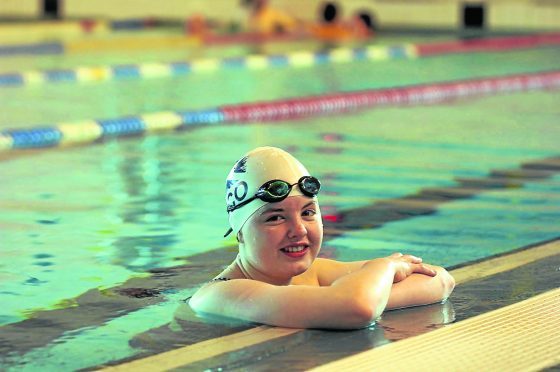A top Highland swimmer who funded her own leg amputation due to an excruciating condition is hopeful a strong case will soon be put to the NHS to start doing the operation.
Hope Gordon, of Rogart, fought a lengthy battle to have her leg removed to put an end to the “stabbing” pain it caused her on a daily basis.
At the age of 12, she was diagnosed with complex regional pain syndrome (crps), a neurological condition triggered by an injury which left her on crutches and eventually a wheelchair.
But for five years she could not persuade the NHS to agree to the surgery – they said she might still feel pain after amputation as crps is a neurological condition – and turned to crowdfunding to raise £10,000 to pay for a private operation in England last August.
She says the amputation has changed her life.
And the 23-year-old now believes that, with other similar cases coming to light in the media, there will soon be enough evidence to persuade the NHS to change its stance.
Miss Gordon, who swims for the Scottish national team, said: “My surgeon is gathering evidence to put a case together to change it and I’ve had a lot of people with crps contacting me since and asking for it to be changed. I think they (NHS) will reconsider because there are quite a few cases now, all which have had life changing, positive outcomes.
“Life has been great since the operation. It’s like night and day. I didn’t realise just how restricted I was until now. I can walk now and do lots of the things I love doing, especially swimming.
“I also went travelling in the summer which is something I could never think of doing before. I went inter-railing around Europe and left on August 2, exactly a year after my operation.”
Miss Gordon has been back in the pool since last December and last month competed for Scotland at the British Paralympic Championships in Manchester, where she achieved multiple medals and personal bests and a Scottish record in the 400m front crawl.
She now sits on the young people’s panel for Scottish Disability Sport which meets several times a year and helps run events, acting as a voice for young people with disabilities.
Her role involves promoting disabled sport by raising awareness and educating teachers, especially PE teachers, to show that a child with a disability can participate in sport, be it competitively or for fun.
Miss Gordon, who is studying sport and exercise science at Edinburgh Napier University, said: “It’s really rewarding in that you can prove to young people with disabilities that they can still do all of the things their friends are doing and that they should not feel embarrassed by it.”
